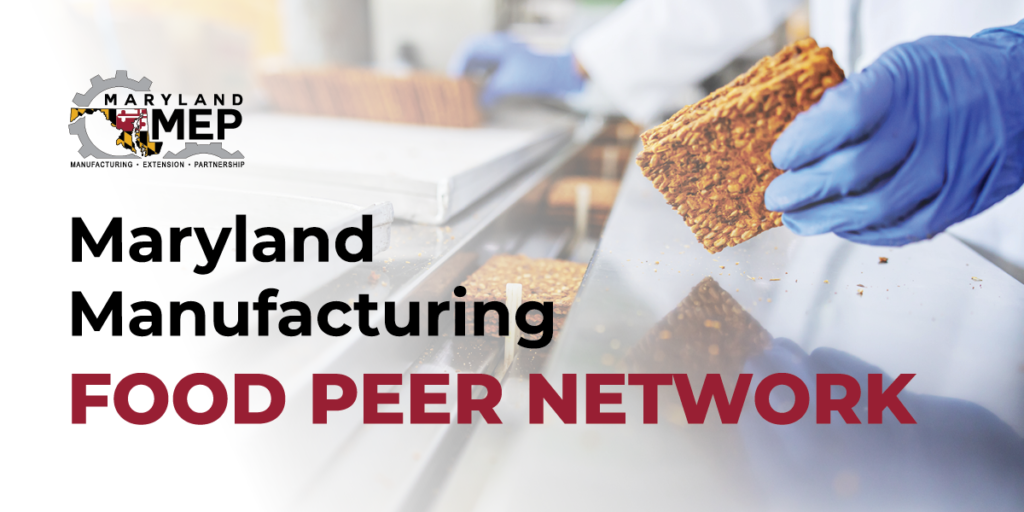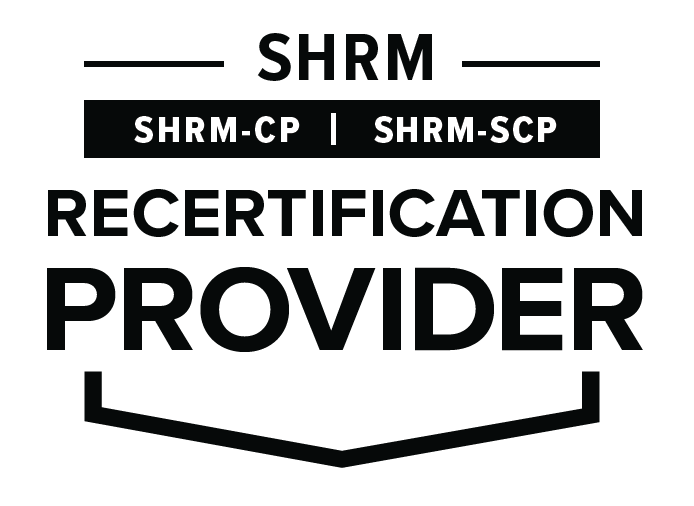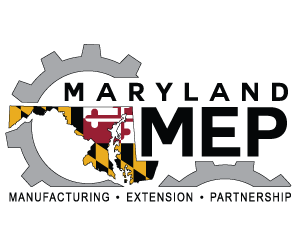
Why join the Manufacturing Food Peer Network?
The Maryland Manufacturing Food Peer Network is a structured six-month program designed to bring together industry professionals to share best practices, address workforce challenges, and strengthen food safety and compliance. The program will feature monthly meetings alternating between in-person and virtual sessions, providing manufacturers with access to expert insights, peer collaboration, and hands-on learning experiences.
Through this initiative, Maryland MEP aims to:
- Enhance Workforce Competencies: Equip professionals with the knowledge and skills to improve production efficiency and regulatory compliance.
- Support Industry-Specific Training: Address critical areas such as food safety, supply chain management, and product innovation.
- Strengthen Maryland’s Food Sector: Promote collaboration and knowledge-sharing among manufacturers to drive business growth and operational excellence.
- Facilitate Economic Growth: Help small and mid-sized food manufacturers scale their businesses, create jobs, and contribute to Maryland’s economy.
Program Benefits
- Industry-focused discussions with peers facing similar challenges.
- Expert insights and best practices tailored to food manufacturing.
- Exclusive facility tours and case studies for hands-on learning.
- Actionable strategies for improving food safety, efficiency, and growth.
Scheduled Meetings & Topics (subject to change)
Sessions will alternate between in person and virtual meetings. In Person Sessions will be 4 hours inclusive of on-site tours. In addition, breakfast and refreshments will be provided. Virtual sessions (ZOOM) will be two hours in length.
Maryland MEP is in the process of scheduling dates and locations for the sessions below.
- Session 1 (September 18th): Peer Group Kick Off In Person Workshop: Scaling Operations & Business Growth
- Session 2 (October 14th): Food Safety, Compliance, & Quality Control (Virtual)
- Session 3 (November 18th): Manufacturing Efficiency and Lean Practices
- Session 4 (December 16th): Supply Chain Challenges & Ingredient Sourcing (Virtual)
- Session 5 (January 20th): Industry Trends & Regulations
- Session 6 (February 17th): Product Development, Packaging, & Labeling
What are the legal changes for 2023 that impact HR and HR professionals? In this session, we will share the latest information on 2023 changes, updates and areas to watch for the HR professional. This session includes changes to HR law including FMLA, OSHA, and EEOC, as well as what to look for as an HR professional.
Attracting and retaining talent is difficult in a tight labor market. Every company feels the recruiting pain in some way. How painful it is depends on how well you develop and execute your attraction and retention strategies. Execution is everything when recruiting and retaining; you must do the hard work or hire someone to do it for you.
Effective leadership in manufacturing creates positive change by inspiring and motivating your team and it is the cornerstone of creating a workplace that elevates all aspects of a manufacturing operation. Great leaders support their team, reduce workplace accidents, and improve worker satisfaction. Too often, employees are promoted based on their technical skills over their personal and leadership skills and they are not given the tools to develop into effective leaders. In this session, we will explore why leadership training is important and how to effectively select and train your next leaders.
In this session, we will cover the top HR trends of 2023 including creative attendance policies, employee benefits, wellness and healthy family programs that are proving beneficial in attracting and retaining employees.
There is a growing consensus in the manufacturing community that it is time for the traditional top-down culture to go away. Inspired by the nimbleness of startups, the mindset of millennials and the ongoing need to worker smarter and faster, manufacturers are increasingly shifting to a less rigid environment as a mean of improving culture, increasing employee engagement, and gaining a competitive edge. This session will focus on practical ways to improve company culture and strategies to increase employee engagement.
Maintaining alignment of employee skills with the needs of the business is crucial for success, especially in a fast-changing business environment. When hiring for new positions, we take great pains to write job descriptions, document requirements of the position, and fully vet any potential candidate against those requirements. We all agree these steps are an important part of the recruiting process. But what about current employees. Businesses are dynamic with ever changing growth opportunities, strategies, organizational changes, etc. Good businesses have processes around defining the requirements of all positions (skills inventory), assessing employees’ skills (assessments) against the requirements, and identifying areas that need improvement (gap assessments). When done well, the gap assessments help develop focused and targeted employee development plans aligning employees and managers on what is needed for the employee to succeed.
This session will focus on understanding what technology and tools are available to support your HR Practice. These tools are the wide range of technological solutions that help organizations manage their day-to-day HR activities effectively. HR processes are compliance-driven and performing them manually is cumbersome, time-consuming, and arduous. HR tools leverage the power of automation allowing HR staff to save time, cut costs, and manage their employees easily. In this session we will discuss the top HR Tools that Maryland manufacturers are utilizing and how they are impacting the business.
The growing skilled labor gap in manufacturing has created a workforce shortage and upskilling and training are now necessary. The important of training workers goes beyond the development of necessary skills but it is also a great motivator and retention tool. As this next generation is looking for more autonomy and development opportunities at work, manufacturers providing on-demand training that allows employees to easily access training at their own pace is providing beneficial to employee morale, company culture and production.
The monthly meetings include discussions around recruitment, employee assessments and skill inventories, attendance policies and flexibility, compliance and legal challenges facing employers, HR Tools, driving peer to peer engagement, leadership development, company culture and more.
Food Peer Group Details

DATE & TIME:
- Begins September 18, 2025
LOCATION:
- Sessions will be a combination of In Person and Virtual
CAPACITY:
- Registration is limited to 15 companies
- Manufacturers Only!
COST:
- $2,500 for MD Manufacturer
- $3,000 for non-MD Manufacturers
- Registration cost is for up to two participants per company.
- $1,000 per additional participant
CONTACT:
For more information about the Food Peer Network, please contact:
Sara Keith
I am so happy to be a part of the Maryland Manufacturing HR Peer group! We discuss the happenings in our organizations and that’s how we learn from each other. We are there to support each other, and there is always something to learn. Maryland MEP does a great job with having guest presentations every time we meet! I am happy to be a part of such an amazing group of HR professionals!
Maryland manufacturers
Maryland MEP Incumbent Worker Training Program
Maryland MEP through the Maryland Department of Labor’s EARN initiative has made funding available for Maryland manufacturers to assist with the total cost of training for incumbent workers. To be eligible, your organization must be registered with Dun and Bradstreet and have a valid manufacturing NAICS code, and have a physical location in Maryland.


